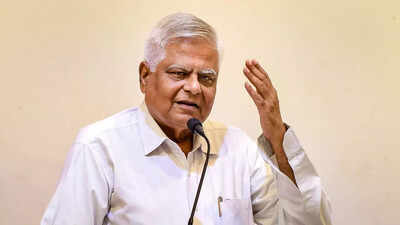Top Searches
- News
- India News
- Gujarat govt should have consulted me: Bilkis judge on remissions
Gujarat govt should have consulted me: Bilkis judge on remissions

MUMBAI: Questioning the process by which the 11 men serving a life sentence in the Bilkis Bano gangrape and murder case were released by Gujarat government, the judge who convicted them said on Tuesday that remission should be available only for convicts who are ashamed of their crime. "The convicts who were released, did they plead guilty or even apologise..."
Justice Umesh Salvi (retired) said, "Government has the power to give remission, but it should think about every factor before giving any decision, or else it isn't right. I don't know if they went through the procedure..." The grounds on which remission was granted remain unknown, he said. "What is that good behaviour? They should spell out what is good behaviour."
"Remission is not unlawful but it must also be seen if justice is being done," Justice Salvi added.
Speaking at a press conference called by an initiative named the United Against Injustice and Discrimination at the Marathi Patrakar Sangh in Mumbai, Justice Salvi recalled that he, as special judge in the Mumbai City Civil and Sessions Court, had given enough opportunities to lawyers of both complainant and accused in the Bilkis Bano case before delivering his verdict. "We don't get influenced by emotions. I gave the verdict on the basis of evidence," he said.
The Gujarat government should have consulted him in the matter because he was the one appointed by the Bombay high court to oversee the trial, he said. "Nobody asked me." Justice Salvi also said that given the seriousness of the crime, the state should have sought the Centre's opinion before taking a decision. "In such cases the state government needs to take advice from the central government as well. Did they do that? I have no idea. If they did, what did the central government say?"
When asked by mediapersons about the felicitation of the convicts outside the jail, he said, "By felicitating such people, you are revolting against the judicial system..." Bilkis Bano was gangraped while attempting to flee the 2002 post-Godhra riots that swept through Gujarat. Her three-year-old daughter and 14 other members of the family were killed in the attack.
Retired judge Abhay Thipsay who heads United Against Injustice and Discrimination said the government has powers of remission but cannot be arbitrary in its use. "It is yet to be proved if Gujarat consulted the court in the state (Maharashtra) where the trial in the Bilkis Bano case was held. In using the discretionary power of remission in this case, the Gujarat government doesn't seem to have acted fairly," he said.
Justice Umesh Salvi (retired) said, "Government has the power to give remission, but it should think about every factor before giving any decision, or else it isn't right. I don't know if they went through the procedure..." The grounds on which remission was granted remain unknown, he said. "What is that good behaviour? They should spell out what is good behaviour."
"Remission is not unlawful but it must also be seen if justice is being done," Justice Salvi added.
Speaking at a press conference called by an initiative named the United Against Injustice and Discrimination at the Marathi Patrakar Sangh in Mumbai, Justice Salvi recalled that he, as special judge in the Mumbai City Civil and Sessions Court, had given enough opportunities to lawyers of both complainant and accused in the Bilkis Bano case before delivering his verdict. "We don't get influenced by emotions. I gave the verdict on the basis of evidence," he said.
The Gujarat government should have consulted him in the matter because he was the one appointed by the Bombay high court to oversee the trial, he said. "Nobody asked me." Justice Salvi also said that given the seriousness of the crime, the state should have sought the Centre's opinion before taking a decision. "In such cases the state government needs to take advice from the central government as well. Did they do that? I have no idea. If they did, what did the central government say?"
When asked by mediapersons about the felicitation of the convicts outside the jail, he said, "By felicitating such people, you are revolting against the judicial system..." Bilkis Bano was gangraped while attempting to flee the 2002 post-Godhra riots that swept through Gujarat. Her three-year-old daughter and 14 other members of the family were killed in the attack.
Retired judge Abhay Thipsay who heads United Against Injustice and Discrimination said the government has powers of remission but cannot be arbitrary in its use. "It is yet to be proved if Gujarat consulted the court in the state (Maharashtra) where the trial in the Bilkis Bano case was held. In using the discretionary power of remission in this case, the Gujarat government doesn't seem to have acted fairly," he said.
FOLLOW US ON SOCIAL MEDIA
FacebookTwitterInstagramKOO APPYOUTUBE
Start a Conversation
end of article










